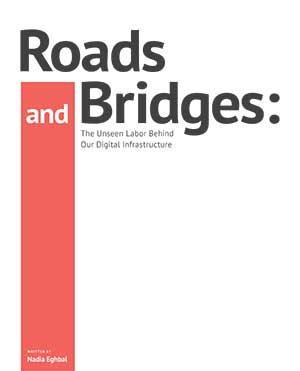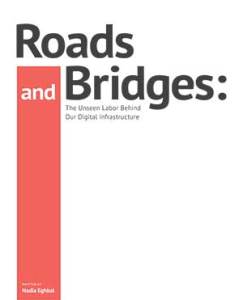Roads and Bridges: The Unseen Labor Behind Our Digital Infrastructure
The Challenge
Free, publicly available source code is the infrastructure on which all of digital society relies. It is vital to the functioning of governments, private companies, and individual lives. However, few realize that public code is built and maintained almost exclusively by unpaid volunteers, and the enormous amount of work required is in desperate need of institutional support. Without effective support for coders’ work on publicly available projects, not only will their labor go uncompensated, but the digital world risks security breaches, interruptions in service, and slowed innovation.
What’s in the Report
In this extensive report, published with support from the Ford Foundation in 2016, writer and investor Nadia Eghbal explores the lack of institutional support for public code. She unpacks how the system currently functions and the unique challenges it faces, and provides recommendations for how to address the problem.
As Eghbal outlines, digital infrastructure should be treated as a necessary public good. Free public source code makes it exponentially cheaper and easier for companies to build software, and makes technology more accessible across the globe. However, there is a common misconception that the labor for open source projects is well-funded. In reality, it is largely created and maintained by volunteers who do it to build their reputations, out of a sense of obligation, or simply as a labor of love. The decentralized, non-hierarchical nature of the public coding community makes it difficult to secure pay for coders, yet the work that emerges from it is the foundation for a digital capitalist economy. Increasingly, developers are using shared code without contributing to its maintenance, leaving this infrastructure strained and vulnerable to security breaches.

Overall, long-term solutions for compensating developers have not received enough attention, and those who are meaningfully paid consider themselves “lucky.” Current business models for digital infrastructure include “bounties” from companies or individuals, sponsorships or donations. While there are some institutional efforts to support digital infrastructure, including by foundations, academia, and corporations, these have not been sufficient. Corporations in particular are not incentivised to work collaboratively in the way that global public coding projects require.
Eghbal emphasizes that because open source thrives on human rather than financial resources, money alone won’t fix the problem. A nuanced understanding of open source culture, and an approach of stewardship rather than control over digital infrastructure are required. She recommends that efforts to fund and support digital infrastructure embrace decentralization, work with existing software communities, and provide long-term, proactive and holistic support. Increasing awareness of the challenges of sustaining digital infrastructure, making it easier for institutions to contribute time and money, expanding and diversifying the pool of open source contributors, and developing best practices and policies across infrastructure projects will all go a long way in building a healthy and sustainable ecosystem.
